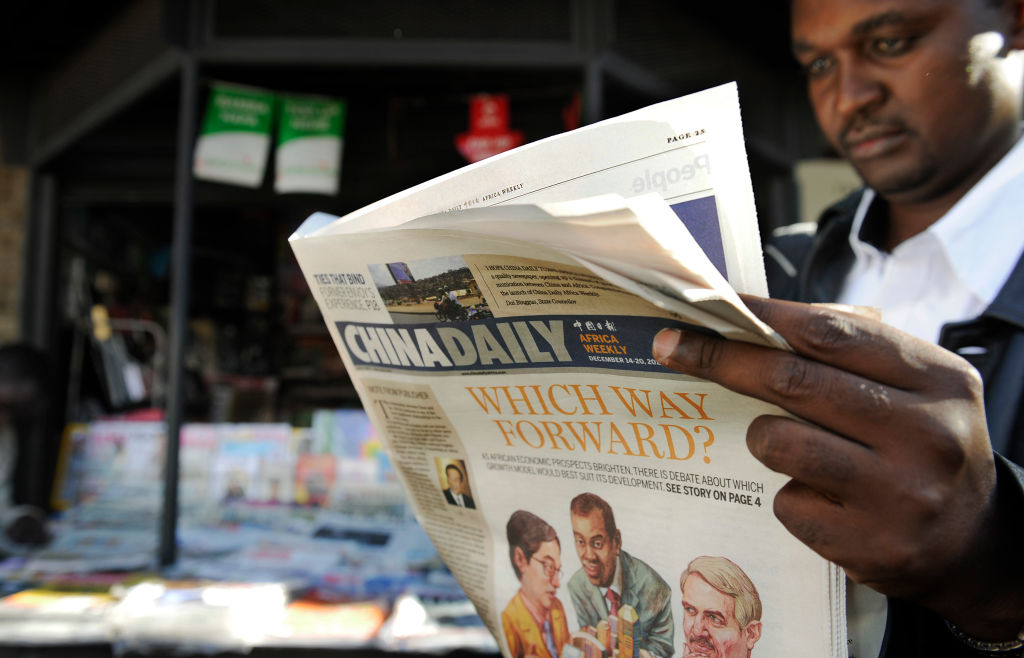ADF STAFF
As a journalist in Kenya, a doctoral student at the Communication University of China and a professor in South Africa, Dr. Bob Wekesa has decades of intimate experience with China’s media and information landscape.
A leading media scholar on China and Africa, Wekesa warns that China increasingly is exporting what he calls its model of “total state control of information.”
Some authoritarian leaders are finding it to be an enticing sales pitch.
“In China, information is just an asset, a resource,” Wekesa said in a May 12 interview with the Africa Center for Strategic Studies. “It’s capital just the way you have economic assets building cars and machines.
“China is in an information war.”
Official figures for China’s global information efforts are unavailable, but experts estimated its pre-pandemic budget exceeded $10 billion per year.
“The Chinese government, under the leadership of President Xi Jinping, is accelerating a massive campaign to influence media outlets and news consumers around the world,” Freedom House wrote in a 2022 report. The human rights organization studied China’s media influence in 30 countries from January 2019 to December 2021.
Between 2017 and 2020, Freedom House senior research analyst Sarah Cook identified “a dramatic expansion in [China’s] efforts to shape media content and narratives around the world, affecting every region and multiple languages.”
In 2022, Freedom House estimated that China devoted “billions of dollars a year to its foreign propaganda and censorship efforts.”
In Nigeria, China’s attempts to influence the media were “very high,” according to the Freedom House report. It also noted that the Chinese embassy in Nigeria reportedly has contacted editors and paid journalists not to cover negative stories.
In Kenya, influence efforts were “high.” In one of the report’s examples, a Chinese state-owned company threatened to sue The Standard newspaper for reporting on abuses at a railway it operated. When editors refused to retract the article, the Chinese embassy canceled its advertising.
Wekesa said China is institutionalizing its approach to exporting state-controlled media. It trains African journalists and editors as part of exchange programs that come with all-expense-paid trips to China. Participants are instructed not to criticize African presidents, ministries or Chinese officials.
“They become some kind of journalistic ambassadors for Beijing to the continent, helping build relations back in their newsrooms and persuade their colleagues on the continent to use as much [propaganda] content as possible,” Wekesa said.
“Criticism of the Communist Party of China is not allowed in China and therefore shouldn’t be allowed in Africa.”
Xinhua, China’s official news agency, has 37 bureaus in Africa — more than any other media agency.
As of early 2023, several media companies have signed cooperation and content-sharing agreements with Xinhua in countries including Egypt, Ghana, Kenya, Nigeria, South Africa, Zambia and Zimbabwe.
Another method China employs to export influence and disseminate information is purchasing ownership stakes in African media companies and then pushing favorable news coverage and censorship practices.
The impact on editorial decisions is clear, as one African journalist at the China Global Television Network explained to Emeka Umejei for his 2020 book “Chinese Media in Africa: Perception, Performance, and Paradox”:
“We know what is acceptable and what is not acceptable. These things will be made clear to you when you join as to what kind of reporting is expected of you and what direction you are expected to take.”
Another tenet of China’s model is selling the entire spectrum of telecommunications infrastructure — smart and basic phones, networks for wireless and wired data — along with information technology and surveillance tools that allow governments to monitor and block websites and shut down internet access.
But where authoritarian-leaning leaders see the benefits of controlling their countries’ information environments, experts are warning citizens and government officials that Chinese tech comes pre-loaded with privacy and security vulnerabilities.
Wekesa has witnessed Africa’s ongoing migration from analog to digital broadcasting and publishing, much of which has been built with Chinese technology and loans.
He expects China will continue to embed and expand its “total control” model deeper into the African media sector.
“We are very likely to see gadgets like cameras, production equipment and broadcasting vehicles coming more and more from China,” he said. “Africans and African media practitioners must be vigilant to understand that some of these might come with certain technologies that are embedded.
“They need to do due diligence so that you can see the equipment and the technologies are not harmful to African audiences or the media houses themselves.”

